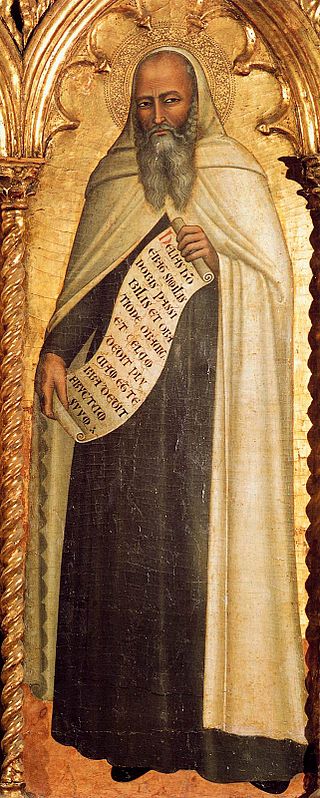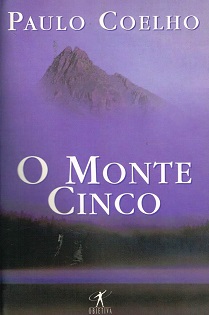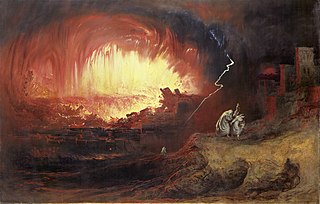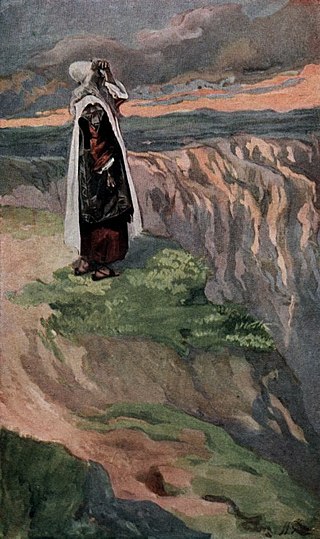
The raising of the son of the widow of Zarephath is a miracle of the prophet Elijah recorded in the Hebrew Bible, 1 Kings 17, taking place in the Phoenician city of Zarephath.

The raising of the son of the widow of Zarephath is a miracle of the prophet Elijah recorded in the Hebrew Bible, 1 Kings 17, taking place in the Phoenician city of Zarephath.
1 Kings 17 is the chapter in which Elijah is first mentioned by name in the Bible. It states that he is a Tishbite from Gilead, who visited King Ahab to give him a message from God that there would be no rain in the land until he declared it (v1). In order to avoid the wrath of the king, God told Elijah to hide by the Brook Cherith where he was fed bread and meat by ravens sent from God (vv2-6).
After a while, due to the drought, the brook dried up so God told Elijah to go to the town of Sarepta and to seek out a widow that would find him water and food (vv.7-9). Elijah learns that the widow has a son and between them they only have enough flour and oil for one more meal before they die. Despite this, the widow helps Elijah (vv11-14). Because she did this God caused the flour and the oil never to run out (vv15-16). "[The widow had] a handful of meal in a barrel, and a little oil in a cruse ... and the barrel of meal wasted not, neither did the cruse of oil fail". (King James Version).


1 Kings 17:17-18 After this the son of the woman, the mistress of the house became ill. And his illness was so severe that there was no breath left in him 18 And she said to Elijah, "What have you against me, O man of God? You have come to me to bring my sin and remembrance and to cause the death of my son!"
Victor H. Matthews suggests that the woman "uses sarcasm which is designed to shame the prophet for being the cause of her son's death." Elijah does not try and rationalise with the grieving woman and takes the son up to his bedroom where he prays to God asking for his help.
1 Kings 17:21-22 And he stretched himself upon the child three times, and cried unto the Lord, and said, "O Lord my God, I pray thee, let this child's soul come into him again". 22 And the Lord heard the voice of Elijah; and the soul of the child came into him again, and he revived.
He then takes the child downstairs again and presents him, living, to his mother. This causes her to declare "Now by this I know that thou art a man of God" (v24), Elijah therefore "regains his honor and his status." [1]
Rabbi Eliezer ben Hyrcanus, also known as Rabbi Eliezer Hagadol, relates that the son raised by Elijah was none other than the prophet Jonah, most notably associated with the incident involving a giant fish. [2] Commentators have noted verbal parallels with the raising of the son of the widow of Nain in the Gospel of Luke chapter 7. [3] The miracle is represented in the Dura synagogue murals. [4]
The Book of Kings is a book in the Hebrew Bible, found as two books in the Old Testament of the Christian Bible. It concludes the Deuteronomistic history, a history of ancient Israel also including the books of Joshua, Judges, and Samuel.

Elijah was a prophet and a miracle worker who lived in the northern kingdom of Israel during the reign of King Ahab, according to the Books of Kings in the Hebrew Bible.

Samuel is a figure who, in the narratives of the Hebrew Bible, plays a key role in the transition from the biblical judges to the United Kingdom of Israel under Saul, and again in the monarchy's transition from Saul to David. He is venerated as a prophet in Judaism, Christianity, and Islam. In addition to his role in the Bible, Samuel is mentioned in Jewish rabbinical literature, in the Christian New Testament, and in the second chapter of the Quran. He is also treated in the fifth through seventh books of Antiquities of the Jews, written by the Jewish scholar Josephus in the first century. He is first called "the Seer" in 1 Samuel 9:9.

The Messiah in Judaism is a savior and liberator figure in Jewish eschatology who is believed to be the future redeemer of the Jews. The concept of messianism originated in Judaism, and in the Hebrew Bible a messiah is a king or High Priest of Israel traditionally anointed with holy anointing oil.

The raising of the son of the widow of Nain is an account of a miracle by Jesus, recorded in the Gospel of Luke chapter 7. Jesus arrived at the village of Nain during the burial ceremony of the son of a widow, and raised the young man from the dead.

The Fifth Mountain is the work of Brazilian author Paulo Coelho published in Brazil in 1996. The book is author's interpretation of the story of Elijah, the old testament prophet and the tale of his trials, tribulations, and suffering all while learning about self love and his capacity to love and forgive his fellow beings.

Vayeira, Vayera, or Va-yera is the fourth weekly Torah portion in the annual Jewish cycle of Torah reading. It constitutes Genesis 18:1–22:24. The parashah tells the stories of Abraham's three visitors, Abraham's bargaining with God over Sodom and Gomorrah, Lot's two visitors, Lot's bargaining with the Sodomites, Lot's flight, the destruction of Sodom and Gomorrah, how Lot's daughters became pregnant by their father, how Abraham once again passed off his wife Sarah as his sister, the birth of Isaac, the expulsion of Hagar, disputes over wells, and the binding of Isaac.

Toledot, Toldot, Toldos, or Toldoth is the sixth weekly Torah portion in the annual Jewish cycle of Torah reading. The parashah tells of the conflict between Jacob and Esau, Isaac's passing off his wife Rebekah as his sister, and Isaac's blessing of his sons.

Luke 7 is the seventh chapter of the Gospel of Luke in the New Testament of the Christian Bible. It tells the records of two great miracles performed by Jesus, his reply to John the Baptist's question, and the anointing by a sinful woman. The book containing this chapter is anonymous, but early Christian tradition uniformly affirmed that Luke the Evangelist, a companion of Paul the Apostle on his missionary journeys, composed this Gospel as well as the Acts of the Apostles.

Pinechas, Pinchas, Pinhas, or Pin'has is the 41st weekly Torah portion in the annual Jewish cycle of Torah reading and the eighth in the Book of Numbers. It tells of Phinehas's killing of a couple, ending a plague, and of the daughters of Zelophehad's successful plea for land rights. It constitutes Numbers 25:10–30:1. The parashah is made up of 7,853 Hebrew letters, 1887 Hebrew words, 168 verses, and 280 lines in a Torah scroll.
Hanina ben Dosa was a first-century Jewish scholar and miracle-worker and the pupil of Yohanan ben Zakkai. He is buried in the town of Arraba in the Lower Galilee.
Passover songs are songs from the seder, the festive meal associated with the Jewish festival of Passover.

Pirkei de-Rabbi Eliezer is an aggadic-midrashic work of Torah exegesis and retellings of biblical stories. Traditionally, the work is attributed to the tanna Eliezer ben Hurcanus and his school. Modern research suggests that the text is pseudepigraphic from the Geonic period of the eighth century, written in or near the Land of Israel.

Allusions in rabbinic literature to the Biblical character Noah, who saved his family and representatives of all the animals from a great flood by constructing an ark, contain various expansions, elaborations and inferences beyond what is presented in the text of the Bible itself.

Allusions in rabbinic literature to the Biblical character Jonah, the unwilling prophet on whom the Book of Jonah centers, contain various expansions, elaborations and inferences beyond what is presented in the text of the Bible itself.

Elisha was, according to the Hebrew Bible, a Jewish prophet and a wonder-worker. His name is commonly transliterated into English as Elisha via Hebrew, Eliseus via Greek and Latin, or Alyasa via Arabic, and Elyasa or Elyesa via Turkish. Also mentioned in the New Testament and the Quran,[6:86][38:48] Elisha is venerated as a prophet in Judaism, Christianity and Islam and writings of the Bahá'í Faith refer to him by name.

2 Kings 4 is the fourth chapter of the second part of the Books of Kings in the Hebrew Bible or the Second Book of Kings in the Old Testament of the Christian Bible. The book is a compilation of various annals recording the acts of the kings of Israel and Judah by a Deuteronomic compiler in the seventh century BCE, with a supplement added in the sixth century BCE. In this chapter some of Elisha's acts are recorded: the first part is how he helped a poor widow of a prophet to repay her family debts, the second part is how he helped a family to have a son, and the third part is how he helped to make the food of his disciples harmless to eat as well as to multiply a small amount of food to feed about one hundred guests with some leftovers.

1 Kings 17 is the seventeenth chapter of the Books of Kings in the Hebrew Bible or the First Book of Kings in the Old Testament of the Christian Bible. The book is a compilation of various annals recording the acts of the kings of Israel and Judah by a Deuteronomic compiler in the seventh century BCE, with a supplement added in the sixth century BCE. This chapter belongs to the section comprising 1 Kings 16:15 to 2 Kings 8:29 which documents the period of Omri's dynasty. The focus of this chapter is the activity of prophet Elijah during the reign of king Ahab in the northern kingdom.

1 Kings 18 is the eighteenth chapter of the Books of Kings in the Hebrew Bible or the First Book of Kings in the Old Testament of the Christian Bible. The book is a compilation of various annals recording the acts of the kings of Israel and Judah by a Deuteronomic compiler in the seventh century BCE, with a supplement added in the sixth century BCE. This chapter belongs to the section comprising 1 Kings 16:15 to 2 Kings 8:29 which documents the period of Omri's dynasty. The focus of this chapter is the activity of prophet Elijah during the reign of king Ahab in the northern kingdom.

1 Kings 19 is the nineteenth chapter of the Books of Kings in the Hebrew Bible or the First Book of Kings in the Old Testament of the Christian Bible. The book is a compilation of various annals recording the acts of the kings of Israel and Judah by a Deuteronomic compiler in the seventh century BCE, with a supplement added in the sixth century BCE. This chapter belongs to the section comprising 1 Kings 16:15 to 2 Kings 8:29 which documents the period of the Omrides. The focus of this chapter is the activity of prophet Elijah during the reign of king Ahab in the northern kingdom.